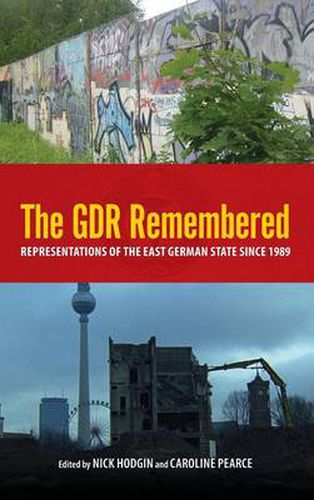Readings Newsletter
Become a Readings Member to make your shopping experience even easier.
Sign in or sign up for free!
You’re not far away from qualifying for FREE standard shipping within Australia
You’ve qualified for FREE standard shipping within Australia
The cart is loading…






Twenty years after the fall of the Berlin Wall, the consequences of the country’s divided past continue to be debated. The legacy of the German Democratic Republic occupies a major role in German popular culture, with audiences flocking to films claiming to depict the East German state as it was. Politicians from both left and right make use of its legacy to support their parties’ approach to unification, while former citizens of the GDR are still working through their own memories of the regime and adjusting to unification.
Since 1989, competing representations of the East German state have emerged, some underlining its repressive nature, others lamenting the loss of asense of community. The twentieth anniversary of the Wende is an occasion to reflect upon both the history of the GDR and the ways in which it has been remembered, and the present volume presents new research on the theme from a variety of perspectives, with sections on film and literature, museums and memorials, and historiography and politics.
Contributors: Thomas Ahbe, Pertti Ahonen, Silke Arnold-de Simine, Stefan Berger, Laura Bradley, Mary Fulbrook, Nick Hodgin, Anna O'Driscoll, Stuart Parkes, Caroline Pearce, Gunter Schlusche, Peter Thompson, Andreas Wagner.
Nick Hodgin is a Cultural Historian working at the University of Sheffield, UK, and Caroline Pearce is Lecturer in German and Interpreting, also at the University of Sheffield.
$9.00 standard shipping within Australia
FREE standard shipping within Australia for orders over $100.00
Express & International shipping calculated at checkout
Twenty years after the fall of the Berlin Wall, the consequences of the country’s divided past continue to be debated. The legacy of the German Democratic Republic occupies a major role in German popular culture, with audiences flocking to films claiming to depict the East German state as it was. Politicians from both left and right make use of its legacy to support their parties’ approach to unification, while former citizens of the GDR are still working through their own memories of the regime and adjusting to unification.
Since 1989, competing representations of the East German state have emerged, some underlining its repressive nature, others lamenting the loss of asense of community. The twentieth anniversary of the Wende is an occasion to reflect upon both the history of the GDR and the ways in which it has been remembered, and the present volume presents new research on the theme from a variety of perspectives, with sections on film and literature, museums and memorials, and historiography and politics.
Contributors: Thomas Ahbe, Pertti Ahonen, Silke Arnold-de Simine, Stefan Berger, Laura Bradley, Mary Fulbrook, Nick Hodgin, Anna O'Driscoll, Stuart Parkes, Caroline Pearce, Gunter Schlusche, Peter Thompson, Andreas Wagner.
Nick Hodgin is a Cultural Historian working at the University of Sheffield, UK, and Caroline Pearce is Lecturer in German and Interpreting, also at the University of Sheffield.